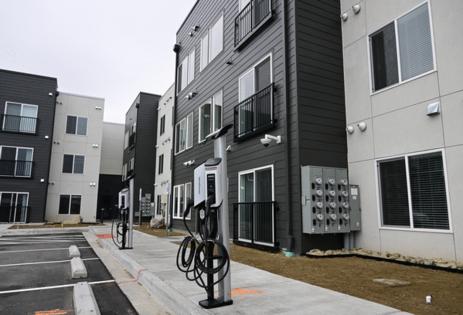Can Colorado cities prevent thousands of apartments from losing affordability protections?
Published in Business News
Nine years ago, one of Silverthorne, Colorado’s few income-restricted housing properties was sold to a private firm. The sale — at a price that was double the property’s assessed value — raised worries in the high-cost mountain community that the new owner of the Blue River Apartments might lift rent caps that had kept its 78 units affordable when the requirements lapsed.
That expiration had been set for this year, and local officials were sufficiently concerned that they struck a deal with the new owners to extend the affordability protections through at least the end of 2025, in exchange for $650,000.
But if the town had known about the sale ahead of time back in 2015, said Ryan Hyland, Silverthorne’s town manager, then officials could have tried to cobble together the money to buy the apartment complex — or arrange its sale to someone else.
As Colorado faces a tidal wave of expiring affordability requirements in the coming years, state lawmakers hope to give local authorities the opportunity Silverthorne didn’t have. House Bill 1175, which has already passed the House, would grant municipalities a right of first refusal to buy subsidized-housing properties when they come up for sale and would also require more notice of expiring affordability covenants.
Once the owner reached a price with a private buyer, the town or city — or a group acting on its behalf — could step in and match the offer, ensuring the units wouldn’t convert to market-rate rents once affordability requirements expire.
“When those expire, (the new owner) could be charging market rents. That’s a smart business decision, if you’re purchasing a property and if you’ve got that on the horizon,” Hyland said. “As you can imagine, there’s those types of deals that happen and the local government has no idea they’re happening, so there’s no opportunity for conversation.”
In the case of Blue River Apartments, as the initial expiration date approached, the president of Tralee Capital in 2020 told the Summit Daily that he wasn’t ready to say how the rental rates would change.
The bill passed the House 38-23 earlier this month and is now headed to the state Senate. It’s the second attempt by a group of Democratic lawmakers to pass a right-of-first-refusal policy, which they say would give local governments the chance to protect renters from for-profit developers that purchase properties and hike rents.
The first swing at passing the policy was a more expansive approach that also would have applied to sales of market-rate buildings. It passed the legislature last year after extensive debate and negotiations.
But business groups successfully lobbied Gov. Jared Polis to veto it, sparking sharp criticism from the Democratic legislators who backed it.
...continued
©2024 MediaNews Group, Inc. Visit at denverpost.com. Distributed by Tribune Content Agency, LLC.







Comments